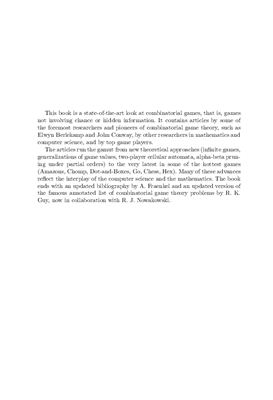Издательство Cambridge University Press, 2002, -547 pp.
This book is a state-of-the-art look at combinatorial games, that is, games not involving chance or hidden information. It contains articles by some of the foremost researchers and pioneers of combinatorial game theory, such as Elwyn Berlekamp and John Conway, by other researchers in mathematics and computer science, and by top game players.
The articles run the gamut from new theoretical approaches (infinite games, generalizations of game values, two-player cellular automata, alpha-beta prun- ing under partial orders) to the very latest in some of the hottest games (Amazons, Chomp, Dot-and-Boxes, Go, Chess, Hex). Many of these advances reflect the interplay of the computer science and the mathematics. The book ends with an updated bibliography by A. Fraenkel and an updated version of the famous annotated list of combinatorial game theory problems by R. K. Guy, now in collaboration with R. J. Nowakowski.
The Big Picture.
Idempotents Among Partisan Games.
On the Lattice Structure of Finite Games.
More Infinite Games.
Alpha-Beta Pruning Under Partial Orders.
The Abstract Structure of the Group of Games.
The Old Classics.
Higher Nimbers in Pawn Endgames on Large Chessboards.
Restoring Faiess to Dukego.
Go Thermography: The 4/21/98 Jiang–Rui Endgame.
An Application of Mathematical Game Theory to Go Endgames: Some Width-Two-Entrance Rooms With and Without Kos.
Go Endgames Are PSPACE-Hard.
Global Threats in Combinatorial Games: A Computation Model with Applications to Chess Endgames 1.
The Game of Hex: The Hierarchical Approach.
Hypercube Tic-Tac-Toe.
Transfinite Chomp.
A Memory Efficient Retrograde Algorithm and Its Application to Chinese Chess Endgames.
The New Classics.
The 4G4G4G4G4 Problems and Solutions.
Experiments in Computer Amazons.
Exhaustive Search in Amazons.
Two-Player Games on Cellular Automata.
Who Wins Domineering on Rectangular Boards?
Forcing Your Opponent to Stay in Control of a Loony Dot-and-Boxes Endgame.
1?n Konane: A Summary of Results.
1-Dimensional Peg Solitaire, and Duotaire.
Phutball Endgames Are Hard.
One-Dimensional Phutball.
A Symmetric Strategy in Graph Avoidance Games.
A Simple FSM-Based Proof of the Additive Periodicity of the Sprague–Grundy Function of Wythoff’s Game.
Puzzles and Life.
The Complexity of Clickomania.
Coin-Moving Puzzles.
Searching for Spaceships.
Surveys.
Unsolved Problems in Combinatorial Game Theory: Updated.
Bibliography of Combinatorial Games: Updated.
This book is a state-of-the-art look at combinatorial games, that is, games not involving chance or hidden information. It contains articles by some of the foremost researchers and pioneers of combinatorial game theory, such as Elwyn Berlekamp and John Conway, by other researchers in mathematics and computer science, and by top game players.
The articles run the gamut from new theoretical approaches (infinite games, generalizations of game values, two-player cellular automata, alpha-beta prun- ing under partial orders) to the very latest in some of the hottest games (Amazons, Chomp, Dot-and-Boxes, Go, Chess, Hex). Many of these advances reflect the interplay of the computer science and the mathematics. The book ends with an updated bibliography by A. Fraenkel and an updated version of the famous annotated list of combinatorial game theory problems by R. K. Guy, now in collaboration with R. J. Nowakowski.
The Big Picture.
Idempotents Among Partisan Games.
On the Lattice Structure of Finite Games.
More Infinite Games.
Alpha-Beta Pruning Under Partial Orders.
The Abstract Structure of the Group of Games.
The Old Classics.
Higher Nimbers in Pawn Endgames on Large Chessboards.
Restoring Faiess to Dukego.
Go Thermography: The 4/21/98 Jiang–Rui Endgame.
An Application of Mathematical Game Theory to Go Endgames: Some Width-Two-Entrance Rooms With and Without Kos.
Go Endgames Are PSPACE-Hard.
Global Threats in Combinatorial Games: A Computation Model with Applications to Chess Endgames 1.
The Game of Hex: The Hierarchical Approach.
Hypercube Tic-Tac-Toe.
Transfinite Chomp.
A Memory Efficient Retrograde Algorithm and Its Application to Chinese Chess Endgames.
The New Classics.
The 4G4G4G4G4 Problems and Solutions.
Experiments in Computer Amazons.
Exhaustive Search in Amazons.
Two-Player Games on Cellular Automata.
Who Wins Domineering on Rectangular Boards?
Forcing Your Opponent to Stay in Control of a Loony Dot-and-Boxes Endgame.
1?n Konane: A Summary of Results.
1-Dimensional Peg Solitaire, and Duotaire.
Phutball Endgames Are Hard.
One-Dimensional Phutball.
A Symmetric Strategy in Graph Avoidance Games.
A Simple FSM-Based Proof of the Additive Periodicity of the Sprague–Grundy Function of Wythoff’s Game.
Puzzles and Life.
The Complexity of Clickomania.
Coin-Moving Puzzles.
Searching for Spaceships.
Surveys.
Unsolved Problems in Combinatorial Game Theory: Updated.
Bibliography of Combinatorial Games: Updated.

